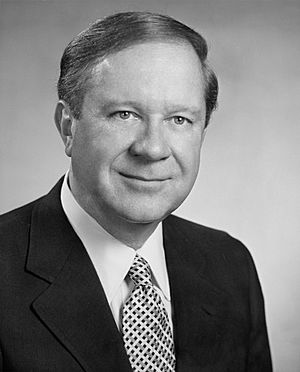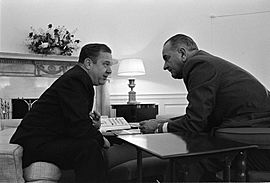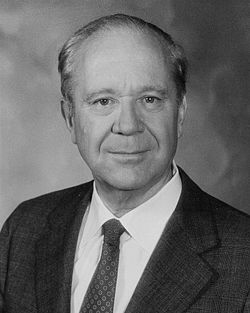Russell B. Long facts for kids
Quick facts for kids
Russell B. Long
|
|
|---|---|

Long in the 1960s
|
|
| United States Senator from Louisiana |
|
| In office December 31, 1948 – January 3, 1987 |
|
| Preceded by | William C. Feazel |
| Succeeded by | John Breaux |
| Chair of the Senate Finance Committee | |
| In office January 10, 1966 – January 3, 1981 |
|
| Preceded by | Harry F. Byrd |
| Succeeded by | Bob Dole |
| Senate Majority Whip | |
| In office January 3, 1965 – January 3, 1969 |
|
| Leader | Mike Mansfield |
| Preceded by | Hubert Humphrey |
| Succeeded by | Ted Kennedy |
| Personal details | |
| Born |
Russell Billiu Long
November 3, 1918 Shreveport, Louisiana, U.S. |
| Died | May 9, 2003 (aged 84) Washington, D.C., U.S. |
| Political party | Democratic |
| Spouses |
|
| Children | 2 |
| Parents |
|
| Relatives | Long family |
| Education | Louisiana State University (BA, LLB) |
| Military service | |
| Allegiance | |
| Branch/service | |
| Years of service | 1942–1945 |
| Rank | Lieutenant |
| Unit | United States Navy Reserve |
| Battles/wars | World War II:
|
| Awards | Four Battle stars for service in North Africa and Europe |
Russell Billiu Long (born November 3, 1918 – died May 9, 2003) was an American politician. He was a Democrat who served as a U.S. Senator for Louisiana from 1948 to 1987.
Because he had served for a long time, he became the chairman of the Senate Finance Committee. He held this important role for fifteen years, from 1966 to 1981. During this time, he helped put into action programs like President Lyndon Johnson's Great Society and War on Poverty plans. Long also served as the Assistant Majority Leader (Senate Majority Whip) from 1965 to 1969.
Russell Long was the son of Rose McConnell Long and Huey Long, who were also famous politicians from Louisiana. Russell Long worked in the Senate during the time of eight U.S. presidents, from Truman to Reagan. He was known for helping the elderly, disabled, working poor, and middle class. He had a lot of influence in the Senate and helped shape many important tax laws.
While studying at LSU, Long met and married Kathryn Haddock. They had two daughters, Kay and Pam. Later, he married Carolyn Bason.
As chairman of the Senate Finance Committee, Long was in charge of all federal money coming in and 40 percent of all government spending. This included programs like Social Security, Medicare, Medicaid, unemployment insurance, and food assistance. He also dealt with foreign trade. In 1980, his fellow senators voted him the most effective chairman and debater. When he retired in 1987, 75 percent of voters in Louisiana approved of his work.
Contents
Early Life and Education
Russell Billiu Long was born in Shreveport, Louisiana on November 3, 1918. His parents were Huey Long and Rose McConnell Long. His father changed his name to Russell after he was born. He was named after his mother's favorite cousin, Russell Billiu.
Long earned his first degree from Louisiana State University in 1939. He then got his law degree from Louisiana State University Law Center in 1942. During his college years, he was very active. He served as president of his freshman class and later as student body president.
Military Service in World War II
In June 1942, during World War II, Long joined the United States Navy Reserve. He took part in important invasions in Northern Africa, Sicily, Italy, and Southern France. He commanded a landing craft transport (LCT) vessel during the first landing at Cavalaire-sur-Mer.
For his service, he received four battle stars. He left the Navy as a lieutenant in December 1945.
Senate Career and Key Roles
After the war, Long became a lawyer. In 1947, he helped his uncle, Earl Long, become governor again. When Earl Long became governor in 1948, he made Russell Long his executive counsel. Russell Long was then elected to the U.S. Senate in 1948. He filled a spot that became open when Senator John H. Overton died.
Long became the only person in U.S. history to have both his father and mother serve in the Senate before him. He was elected on November 2, 1948, just one day before his 30th birthday. He took office on December 31, meeting the rule that senators must be at least 30 years old.
From 1953 to 1987, Long was a member of the Senate Finance Committee. This committee deals with taxes. He was its chairman for 15 years, from 1966 to 1981. Long also served as President Lyndon B. Johnson's main leader in the Senate. He helped pass bills for many Great Society programs, including the creation of Medicare in 1965. He was the Democratic Assistant Majority Leader (whip) from 1965 to 1969.
Long knew a lot about federal tax laws. He often added his ideas as small changes to tax bills. This was a smart way to get his goals achieved. The Senate Finance Committee controlled all federal money and 40 percent of government spending. This gave Long a lot of power over major money bills and programs.
Major Achievements in Lawmaking
Long wanted to help people in need while also giving tax breaks to the middle class and small businesses. He especially cared about older people who were poor. His colleagues even called his aid ideas "grandma amendments."
In 1956, Long helped expand Social Security to include benefits for disabled people and their families. He also helped pass President John F. Kennedy's big tax cut bill in 1964. This showed he was a rising leader.
Long created the Earned Income Tax Credit (EITC). This is a very important program that helps low-income working families by reducing their taxes. It encourages work instead of direct welfare payments. In 2016, the EITC helped millions of Americans, including children, get out of poverty. It also helped many more families reduce how poor they were.
Long also created employee stock ownership plans (ESOPs). These plans allow employees to own stock in their companies. This lets them share in the company's success. To reduce the influence of big money in politics, Long created a way for presidential campaigns to get public funding. Taxpayers could choose to give $1 of their taxes to a Presidential election fund. He also supported the Child Support Enforcement Act. This law requires unmarried fathers to help pay for their children.
Long was a strong supporter of tax breaks for businesses. He believed that businesses needed money to grow and create jobs. He once said, "You're going to have to have capital if you're going to have capitalism."

Long was famous for getting his ideas into law by adding small but important changes to tax bills. For example, in 1966, he helped pass a law that allowed the merger of the American Football League and the National Football League (NFL). This was put into a tax bill. Without this law, the merger would have been against anti-trust rules. In return for his help, Long asked the NFL to give a new team to New Orleans. This led to the creation of the New Orleans Saints.
In 1972, Long also created the United States District Court for the Middle District of Louisiana. This court covers nine parishes around Baton Rouge. He did this by adding a small change to a tax bill.
Election Campaigns
1948 Election
In 1948, Long first won against Judge Robert F. Kennon in the Democratic primary election. The vote was very close. Then, he easily defeated the Republican candidate, Clem S. Clarke, in the main election. Long received 75 percent of the votes. This was the first time a Republican had run for U.S. Senate in Louisiana since 1914.
Later Elections
After 1948, Long never had a very close election again. He won his first full six-year term in 1950. He easily defeated his Democratic opponent, Malcolm Lafargue, and then the Republican, Charles Sidney Gerth.
In 1962, Long won against Philemon Andrews "Phil" St. Amant in the Democratic primary. He then easily defeated Republican Taylor W. O'Hearn.
Long was expected to run for governor in 1963, but he decided not to. He supported his cousin, Gillis W. Long, instead.
In 1964, Long supported the Johnson-Humphrey ticket for president, even though many other Southern senators did not. This did not hurt his career. Republicans did not challenge his re-election in 1968, 1974, and 1980.
In 1968, Long won his primary election. He ran unopposed in the general election. In 1974, he easily defeated Sherman A. Bernard in the Democratic primary. The Republican party could not find a strong candidate to run against him.

In 1980, Long defeated State Representative Woody Jenkins. During this campaign, Long's friend, Republican Senator Bob Dole, even made a TV commercial to support Long. This was the last time Long's name was on a ballot.
Near the end of his time in office, Long hired a young journalist named Bob Mann. Mann later wrote a book about Senator Long's life and work.
Retirement and Later Life
After thinking about running for governor of Louisiana, Long decided to retire from the Senate in January 1987. His fellow senators praised his work. Senator J. Bennett Johnston said Long's absence would leave a "huge void." President Ronald Reagan called him a "legend" and one of the most skilled lawmakers in history.
In 1986, Democratic U.S. Representative John Breaux was elected to take Long's place in the Senate.
After retiring, Long stayed in Washington, D.C. He became a highly sought-after lobbyist. He also served on the boards of major companies like the New York Stock Exchange and Lowe's Companies, Inc..
In 1996, he supported Mary Landrieu for the Senate. She won against Woody Jenkins, the same person Long had beaten in his last Senate race in 1980.
Political Beliefs
Long was known for being practical in politics. He was inspired by his father's ideas of helping ordinary people. He supported social programs like the New Deal and the Great Society. However, he was more traditional than his father on business, states' rights, and foreign policy.
Long's views on race relations changed over his 38 years in office. Even though he supported segregation early in his career, he later received more than 90% of the African American vote in his elections. He was often criticized by groups like the White Citizens Council for his more moderate views on race.
In the 1950s, Long signed the Southern Manifesto, which supported segregation. He later said he regretted this. He believed that moving too quickly on desegregation could cause violence. But he also felt that not doing enough would fail to improve the lives of African Americans.
In 1953, Long disagreed with other Southern senators. He supported Alaska and Hawaii becoming states. Other Southern senators had blocked this for years. They worried about more non-white people in Congress and more votes for civil rights.
Long became Assistant Majority Leader in 1965 and chairman of the Senate Finance Committee in 1966. He worked to help minorities, the poor, and the elderly. He guided important social welfare laws of President Johnson's Great Society and War on Poverty programs. His achievements include creating Social Security benefits for the disabled, Medicare and Medicaid, child support enforcement, ESOPs, and the Earned Income Tax Credit (EITC).
Long was one of only four Southern senators to vote for the Economic Opportunity Act of 1964. This act included most of President Johnson’s anti-poverty programs. As Majority Whip, he helped pass many Great Society laws. These included Medicare, the Clean Water Act, and the Elementary and Secondary Education Act.
Long was the only Southern senator to vote against the poll tax in both 1960 and 1965. He urged Presidents Kennedy and Johnson to send federal officials to the South to register black voters. Although he voted against the Voting Rights Act of 1965, he refused to block it. He later voted to strengthen the Voting Rights Act in 1975 and 1982.
In 1960, Long was the first Southern senator in the 20th century to hire black staff members. His Senate office helped start the careers of many African Americans.
Rev. Martin Luther King Jr. said Long's election as Assistant Majority Leader in 1965 was a "blessing in disguise." He thought it might help end the strong Southern voting bloc. After King was assassinated in 1968, Long said he tried to continue his father's work to help poor people, both black and white. In 1983, Long supported creating the federal holiday of Martin Luther King Jr. Day.
Long supported investigating the 1972 presidential campaigns after the Watergate break-in. He also helped lead a committee that found President Nixon owed a lot of money in back taxes.
To fight economic problems in the 1970s, Long helped pass President Ford’s 1974 Trade Reform Act and 1975 tax cut bill. These included the creation of the EITC and ESOPs.
Long disagreed with President Carter's energy policies. However, he supported Carter's tax cuts and the creation of the Department of Energy. He also supported the Panama Canal Treaty. Long helped save the Chrysler Corporation from bankruptcy in 1979. This included a large ESOP for Chrysler’s workers.
Death
Russell Long died from heart failure on May 9, 2003. At the time of his death, he was the last living former senator who had served in the 1940s. His funeral was held in Baton Rouge.
Images for kids
See also
 In Spanish: Russell Long para niños
In Spanish: Russell Long para niños


